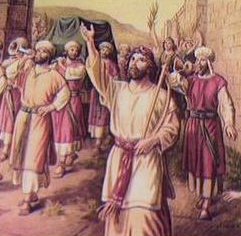While reigning as king of Israel, David founded the City of David in Jerusalem and built fortifications to hold the city against enemies. He defeated the Philistines, the strongest of Jerusalem's neighbors, to expand the empire. King David defeated other neighbors such as the Moabites, the Edomites, the Ammonites, and the Arameans. Although the wars started as defensive battles for the Israelites, they conquered these tribes to further expand the empire.

Once his nation was fortified and stable, David began devising a government, the first for that area. He declared Jerusalem as the center of all secular and religious actions of the Israelites. In this city, he set up many institutions to manage the military, religious, and civil actions. David desired to build a great temple in the old city of Jerusalem, bu he was told by the prophet Natan that his son would take care of that task. He changed the Jewish religion by making hymns to the Ark of the Convenant and performing public dispays of faith.
David is also known as one of Jesus' ancestors. Through relation, David helped give rise to a religion practiced world wide.